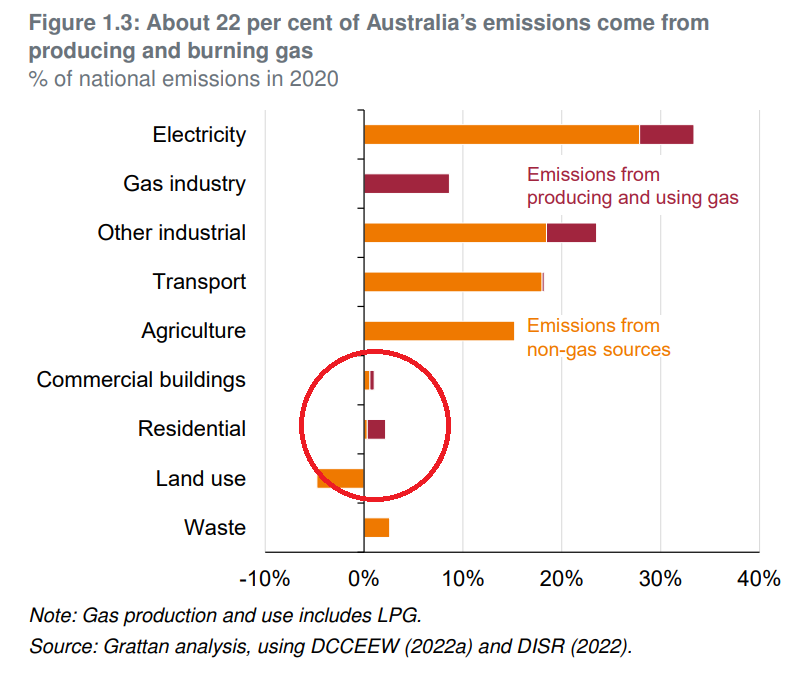Tony Wood is a former Origin Energy executive turned energy think tank analyst at the Grattan Institute, which Origin Energy sponsors.
Today he writes:
Since the late 1960s, Victoria has relied on its wealth of offshore gas in Bass Strait, extracting enough for its own needs and exporting to South Australia and NSW. Its abundance and affordability led to more homes and small businesses taking up gas than in any other Australian jurisdiction. More than two million Victorian homes still use gas.
Change is coming slowly – last year, the state used about 177 petajoules of gas, the lowest demand this century. Annual output from Bass Strait’s gas fields is now around 300 petajoules and falling steadily. But this is an annual figure – it’s hard to ramp up production to meet sudden increases in demand.
The problem came to a head this cold, still winter. Wind and hydro power production fell. People fired up gas heaters, and gas power plants had to cover more electricity demand. Stored gas rapidly ran low.
At winter’s end, demand for gas falls off sharply. But this seasonal problem will soon become continuous as production keeps falling.
The state government is belatedly planning to phase out gas. These plans are welcome, but too late to solve the immediate problem. Getting Victoria off gas means 200 households have to quit gas every day for the next 20 years.
…Australia has a lot of gas, but it is unevenly distributed.
Most large current or future gas fields are in Queensland, Western Australia and the Northern Territory. To send it thousands of kilometres south would require major upgrades to existing pipelines or new, bigger pipelines. Investors have shown limited interest.
The NSW import terminal under construction at Port Kembla, near Wollongong, could deliver gas to Victoria via existing pipelines. But so far, energy retailers have not committed to use it, likely because potential seasonal shortfalls are not yet severe enough to cover the cost of its use.
That leaves shipping it directly to Victoria from overseas or from northern ports. It sounds odd for a major producer to import gas – but it could be the cheapest solution.
Our major gas buyers – Japan, Korea and China – have built large LNG import terminals, with giant tanks and lots of infrastructure. A Victorian import terminal would look very different, as it would be a temporary measure to ensure gas keeps flowing until demand ceases.
Let’s look at a different kind of history. The catastrophic recommendations of Tony Wood at the Grattan Institute, sponsored by Origin Energy.
In 2013, as Origin Energy prepared to export enormous quantities of east coast gas, mostly to China, Wood demanded there be no domestic reservation:
“With more than $160 billion forecast to be invested in LNG production, the export industry is good for the economy. Governments should therefore resist self-interested calls from some industries to reserve gas or cap prices for the domestic market”.
“One reason that reserving gas is a bad idea is that there is no shortage of gas. The challenge is to ensure that the gas gets delivered to where it is required, and this means commercial buyers and sellers need to reach commercial terms on new arrangements”.
“Capping prices for the domestic gas market is a very bad idea. It amounts to a tax on producers and a subsidy for domestic gas users. Protectionism of this sort may provide some short-term price relief for targeted industries, but it tends to mean inefficient businesses and less investment”.
“Ultimately it leads to higher prices and damages the economy for us all”.
Yeh, well, history proved the opposite. WA and everybody else’s gas reservation has kept prices low. At the same time, the east coast of Australia has been stuck in a permanent gas price shock since Wood, Grattan and Origin Energy prevented reservation.
This culminated in Ukraine War gas profiteering in 2022, which is a key part of Australia’s ongoing inflation problem.
Wood returned last year with more calamitous aadvice:
Australia needs to get off natural gas if it is to have any hope of achieving net-zero carbon emissions by 2050, according to a new Grattan Institute report.
Getting off gas: why, how, and who should pay? shows that all-electric homes are cheaper to run and better for people’s health, and that alternative technologies such as hydrogen or biomethane are too costly and too far off for widespread use in homes and small businesses.
The report calls on each state and territory government to set a date for the end of gas.
Why? Residential gas usage is tiny, especially versus gas industry carbon output:

Tony Wood’s appliance smash does absolutely nothing to alleviate climate change. Whereas, the Greens are now rightly demanding that the LNG process be electrified, which would make 500% the difference!
Neither will changing appliances will reduce household bills unless solar panels are included. Gas sets the price of grid electricity anyway and will do so even more into the future as coal exits:

This makes the policy highly regressive. That is, it punishes the poor while rewarding the rich and Origin Energy.
Coming back to the present and Tony Wood’s garbage of today, it is obvious what Australia should do.
The complete opposite of whatever Wood suggests:
- force Origin Energy and the gas export cartel to supply locally 15% of gas currently sent to China;
- build a a few storage tanks in VIC so it can inventory gas piped south from QLD during the off-season when pipelines have capacity, and
- apply an export levy to Origin and the cartel, meaning every cent above $6Gj oversees sales is taken by the Treasury and the local price crashes.
Finally, shutter the captured Grattan Institute before it recommends that Origin Energy be allowed to harvest babies for gasification on behalf of China.

